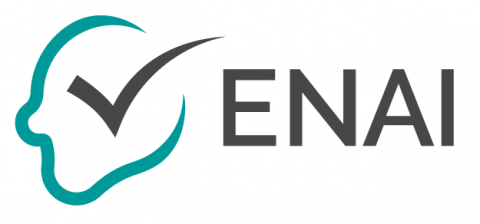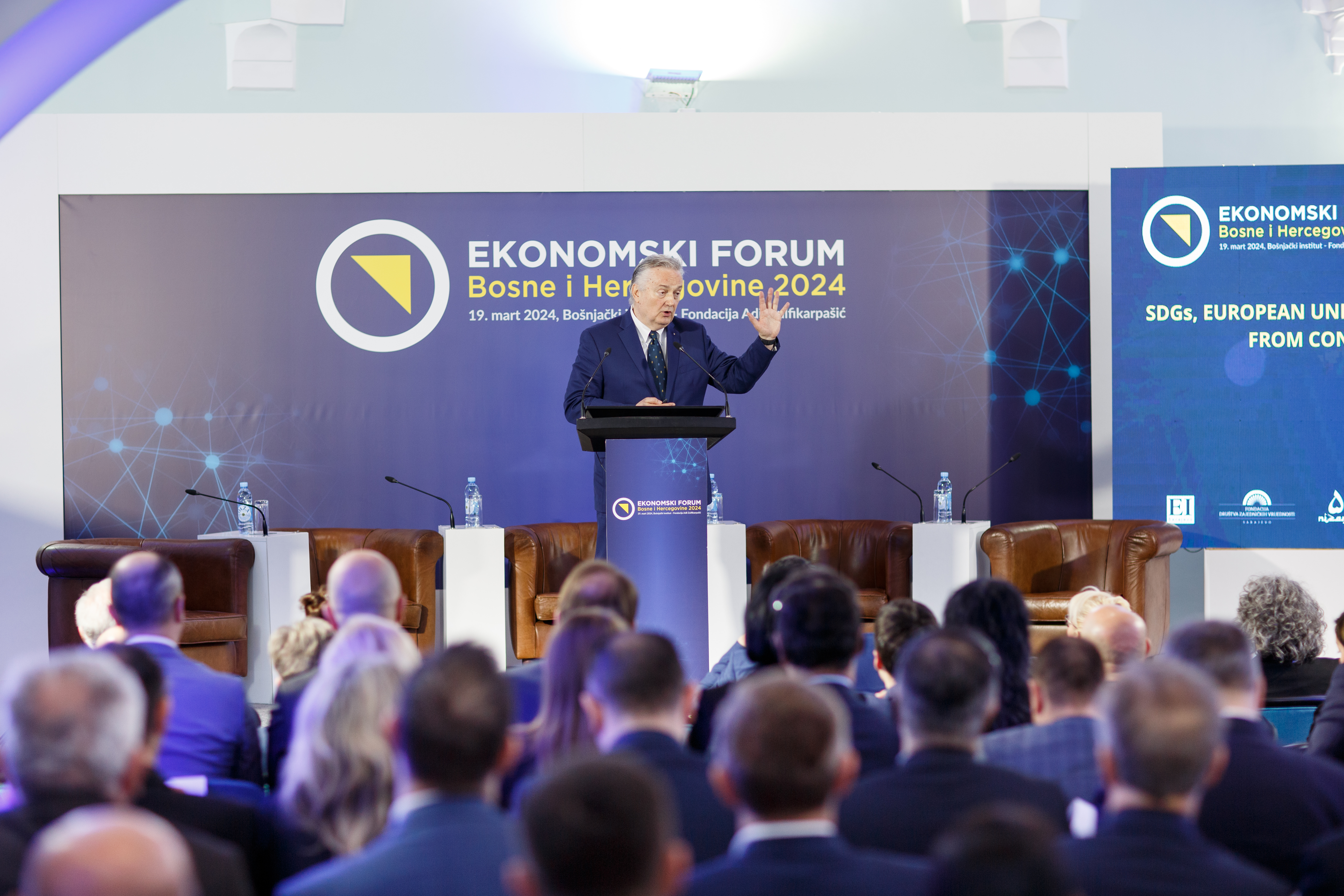Accreditations:
 |  |
Memberships:
 |  |

Today, the second edition of this year's, ninth Economic Forum of Bosnia and Herzegovina took place at the Bosniak Institute – Adil Zulfikarpašić Foundation in Sarajevo.
Focus of the 2024 Forum was on growth and development plans on the path to the European Union, with the implementation of the Future Pact based on the principles of sustainable development, inclusivity, and regional cooperation. The Forum especially focused on strengthening institutional capacities, improving the business environment, and enhancing the standard of living for citizens.
The opening speeches were delivered by Prof. Dr. Zlatko Lagumdžija, Permanent Representative of Bosnia and Herzegovina to the United Nations (UN); Maurizio Massari, Co-Chair of the Group of Friends of the SDGs, EU, WB Reform Agenda 2030, and Permanent Representative of Italy to the UN; Ivana Živković, Assistant Secretary-General of the United Nations, Assistant Administrator, and Director of the UNDP Regional Bureau for Europe and the Commonwealth of Independent States; Jasmina Selimović, Governor of the Central Bank of Bosnia and Herzegovina; and Aurélie Valtat, Head of the EU Integration, Political and Economic Affairs Department at the Delegation of the European Union to Bosnia and Herzegovina.
The Economic Forum of Bosnia and Herzegovina 2024 was officially opened by the Dean of the University of Sarajevo - School of Economics and Business, Prof. Dr. Meliha Bašić, who stated: “I believe that the Economic Forum of Bosnia and Herzegovina has laid the foundation for collaboration between the academic and business communities, as well as policymakers in our country. As organizers, we believe we have raised key questions and stimulated constructive discussions on the steps that lie ahead on the path to our European future. We must approach reforms with determination but also with a vision that leads toward sustainable growth and development. The implementation of the Future Pact represents a key opportunity to strengthen our economy and improve the quality of life for our citizens. This requires the synergy of all sectors, as only through joint efforts and dialogue can we achieve ambitious goals and create strategies that will enable sustainable development and a better future for all. We hope that the ideas and proposals from this forum will translate into concrete actions and results in the future. I thank all participants for their contributions to the success of the Forum.”
In addition to the Dean, the Economic Forum was also opened by Bosnia and Herzegovina's Minister of Foreign Affairs, Elmedin Konaković, who stated: "Bosnia and Herzegovina, like other countries in the Western Balkans, is aware that integration into the European Union is key to achieving long-term economic growth, institutional reforms, and improving the standard of living for our citizens. I call upon the academic and business communities to emphasize how to seize these opportunities and how, as a society, we can accelerate the necessary reforms. We must demonstrate that we are ready to take responsibility in this process, and I believe that, with the support of our international partners, we will successfully reach our goal. All of us in the government of Bosnia and Herzegovina must show determination and ability to take advantage of the opportunities presented and implement the necessary reforms that will bring us closer to European standards. It is important to emphasize that the European Union is not only our most important foreign policy goal but also our key partner in creating a stable, sustainable, and prosperous future.”
Ambassador Dr. Lagumdžija emphasized: “For many years, the Economic Forum has, in a way, predicted the issues we are discussing today, and the second edition of this year's Forum is dedicated precisely to the Berlin Process. The goal is to provide concrete support to the discussion on how to implement everything included in the signed agreement in Berlin, primarily the European Growth Plan. Altogether, our effort at the Economic Forum is to bring together people from the business and academic communities, along with economic policymakers from the Western Balkan countries, to jointly discuss ways to implement the Berlin Plan.”
“The Western Balkans 2030 Working Group,” led by Italy and Bosnia and Herzegovina, represents one of the key initiatives for economic growth and stability in the region, while the involvement of UNDP and UN country teams is indispensable in this process.
Ms. Ivana Živković, Assistant Secretary-General of the UN, Assistant Administrator of UNDP, and Director of the Regional Bureau for Europe and the Commonwealth of Independent States, stated: “Over 75 percent of the Sustainable Development Goals (SDGs) are aligned with EU policy recommendations, focusing on key areas such as poverty reduction, skills and job development, environmental protection, the rule of law, and social policy. This joint commitment, strengthened by the UN’s Future Pact and the EU Growth Plan, underscores the power of green and digital transitions to drive progress. Together, we are shaping a future that is sustainable, fair, and brings real benefits to all citizens of the Western Balkans.”
This year's Forum program was structured into two panels: "Growth Plan – Human Capacities and Institutional Perspective" and "Financing Sustainable Development – Post-Future Summit and COP 29."
In the first panel, titled "Growth Plan – Human Capacities and Institutional Perspective," speakers included Amer Kapetanović, designated Secretary-General of the Regional Cooperation Council; Adrian Kamenica, Director of Development Programs and Cooperation in the Office of the Prime Minister of Albania; Hatidža Jahić, Economic Advisor to the Chairman of the Presidency of Bosnia and Herzegovina, H.E. Dr. Denis Bećirović; and Dragan Tilev, State Secretary at the Ministry for European Integration of the Republic of North Macedonia. The moderator of the first session was Edin Dilberović, Secretary of the Ministry of Foreign Affairs of Bosnia and Herzegovina.
The second session, titled "Financing Sustainable Development – Post-Future Summit and COP 29," featured contributions from Ingrid Macdonald, UN Resident Coordinator in Bosnia and Herzegovina; Admir Softić, Assistant Minister in the Ministry of Foreign Trade and Economic Relations of Bosnia and Herzegovina; Bojan Vujović, Director-General of the Directorate for Coordination of EU Financial Assistance, Ministry of European Affairs of Montenegro; and Jasmin Hošo, Founder and Director of Tondach Bosnia and Herzegovina. The moderator of the second panel was Branimir Muidža, CEO of Heidelberg Materials Cement BiH and General Director of Heidelberg Materials Group in Bosnia and Herzegovina and Croatia.
“We are determined to continue on the path of sustainable development, peace, and prosperity through joint efforts. We are grateful to the UN and UNDP teams in Bosnia and Herzegovina for their dedication, and we look forward to even more intensive cooperation in the future,” concluded Ambassador Dr. Lagumdžija.
The Economic Forum of Bosnia and Herzegovina 2024 was a special opportunity to bring together experts and participants who can actively contribute to shaping economic policies and strategies for the future of the Western Balkans. The comprehensive program allowed for active and inclusive dialogues, as well as a review of the challenges and opportunities ahead.
The Economic Forum of Bosnia and Herzegovina 2024 was organized in cooperation with the United Nations (UN), the United Nations Development Program (UNDP), the Shared Values Foundation, the Nizami Ganjavi International Center (NGIC), the Western Balkans Sustainable Development Solutions Network (WB SDSN), and the Bosniak Institute – Adil Zulfikarpašić Foundation.
University of Sarajevo – School of Economics and Business